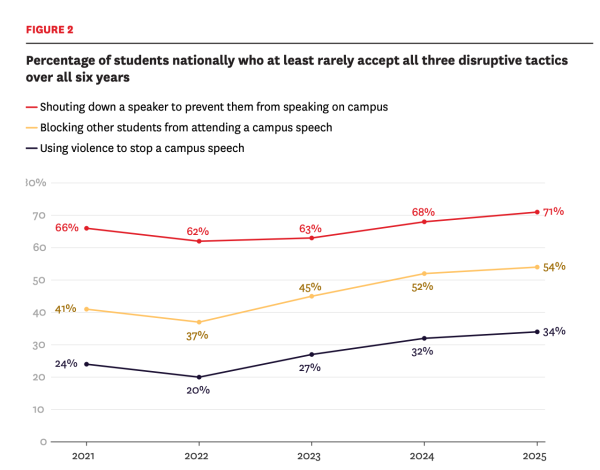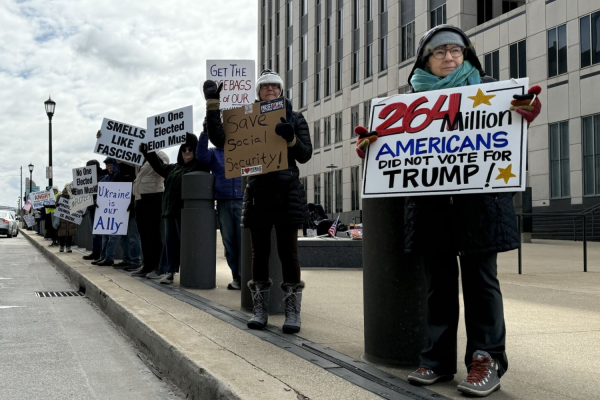Candidates for U.S. Senate Argue over Vision for Young Ohioans
Morgan Harper, a Columbus area Democrat, exchanged words with former Ohio Treasurer Josh Mandel, a Cleveland Republican, in a fiery U.S. Senate debate Monday at the City-God Baptist Fellowship in East Cleveland.
Both candidates debated on a variety of issues including canceling student loan debt and free public college, vaccine mandates, job creation in Ohio, and political violence. There were multiple interruptions, as audience members interjected against Mandel’s inciting words on race. Throughout the debate, Mandel referred to Palestinian leaders as “animals,” Black Lives Matter protestors as “thugs,” and downplayed concerns about the Jan 6th Capitol insurrection.
The debate featured opening statements, a series of questions, and closing statements. Harper opened by highlighting what she called her pro-worker agenda for Ohioans and how she stands against corruption.
Mandel began with the three main reasons he is running for office: Gideon, Juda, and Rosie, his three children. He argued that the “radical left wants to destroy the country” and mentioned Presidents Ronald Reagan and Donald Trump as key inspirations.
The first question of the night went to Harper, who was asked about her support for free public college and student loan debt. She showcased her Ohio Opportunity Guarantee and ten city tours for the policy.
“We must have debt free training and educational opportunities for our young people,” Harper said. “I also support canceling student debt. We have burdened a generation of young people with this debt, many of whom in all sorts of jobs and occupations with no ability to pay off that debt any time soon. It will be an economic boon for the state and ensure that we’re not just supporting tax cuts for large corporations like my candidate tonight and my candidate in the Democratic Party who is funded by corporate interests.”
In response, Mandel claimed that student loan debt cancellation would be an unfair burden for taxpayers.
“Blue collar workers might not have college degrees…” he said, “but why is it fair for them to have their tax dollars pay for someone like Morgan Harper who went to Stanford?”
Harper retaliated with a swift response.
“What we’re talking about is closing tax loopholes for corporations that don’t pay their fair share,” Harper said. “…We don’t have a level playing field, but once we close that loophole, we can create new revenue opportunities.”
Harper spoke to The Exponent about her plans for college students in an interview for the Gen Z Politics Podcast.
“What I’m trying to do is make sure that regardless of where you live, whether it’s in Northeast Ohio or Southeast Ohio, that you are able to access opportunity at every stage of life…” she said. “I tell students that I have a vision for creating 600,000 well-paying jobs in the clean energy sector over 10 years that will build out our public transit infrastructure and have it support electric vehicles. This is going to ensure that we are a state of the future, where our young people, like students, want to stay, have families, become old, eventually retire hopefully and there are policies at the federal level to do that. We don’t have a policy problem; we have a politician problem, and we need better leadership.”
According to the Baldwin Wallace University website, 90% of graduates find employment or enter the graduate school of their choice within six months of graduation. Harper argued that the quality of those educational and job opportunities for BW students and young Ohioans as a whole has decreased due to ineffective taxation policy.
Policy Matters, a progressive Ohio policy think tank, published a report in 2019 that focused on one of the tax loopholes Harper mentioned: the Business Income Deduction (BID). The report found that “tens of thousands of affluent business owners who use the passthrough tax break are also claiming other deductions intended for those with lower incomes.”
The think tank identified that the claims of the BID as a mechanism for job growth were incorrect. The report stated: “The majority of those receiving the break save less than $1,000 a year, nowhere near enough to hire a new employee. Data from the Internal Revenue Service shows that the growth rate of new businesses, based on the number of tax returns from sole proprietorships, partnerships and S corporations, was slower in Ohio than in the nation as a whole from 2012, just prior to the enactment of the tax break, to 2016.”
Mandel declined to speak to The Exponent.
The Senate primary will take place on May 3 with the winners of the Democratic and Republican primaries advancing to the general election on Nov 8.
The Exponent is looking for financial contributions to support our staff and our newsroom in producing high-quality, well-reported and accurate journalism. Thank you for taking the time to consider supporting our student journalists.






































